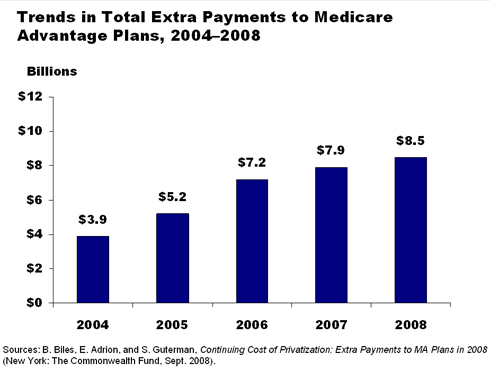Private Medicare Plans Cost Taxpayers More
Private health plans serving Medicare beneficiaries will be paid an average 12.4 percent more per enrollee in 2008, or about $986 more for each beneficiary, compared to what the same enrollee would have cost in the traditional Medicare fee-for-service program, according to a Commonwealth Fund–supported study. In 2008 alone, extra payments to Medicare Advantage (MA) plans will total more than $8.5 billion, up from $3.9 billion in 2004. Even if recently mandated payment reductions had been fully in place in 2008, the plans still would have been paid 10.6 percent more than expected fee-for-service costs, says lead author Brian Biles, M.D.

'Use What Works' to Reform Coverage, Karen Davis Tells Congress
Owing to their success in providing many of our most vulnerable citizens with access to health care and financial protection, Medicare, Medicaid, and the State Children's Health Insurance Program "warrant serious consideration as building blocks for a new system of seamless coverage for America's 46 million uninsured people," Karen Davis told a House health subcommittee during invited testimony Sept. 18. The Commonwealth Fund president argued that "preserving a mixed private–public system of coverage has many advantages." Chief among them, she said, were the ability to limit disruptions in current coverage, build on the strengths of public programs and private coverage, and minimize the need for costly new administrative structures.
Iowa Program Connects At-Risk Kids to Needed Services
Despite the importance of early detection and treatment of social/emotional delays and mental health problems in young children, finding appropriate intervention services is not easy. That's why an innovative program in Iowa—the 1st Five Healthy Mental Development Initiative—is helping pediatric providers screen young children and refer families to needed services. Developed with Fund support, the program has trained providers and staff in participating practices to assess developmental milestones, family stress, and caregiver depression. When concerns are identified, staff contact a 1st Five care coordinator, who meets with the family, assesses its needs, makes referrals to community-based services, and informs the provider of the family's status. To date, providers have made more than 1,500 referrals under the program.
Federal Leadership for Improving Children's Health Care
While efforts to reauthorize and expand the State Children's Health Insurance Program (SCHIP) failed in 2007, they laid much of the groundwork for federal action to expand child health coverage when the new administration takes office. The authors of a new Commonwealth Fund issue brief believe that any future legislation needs to include an explicit focus on promoting healthy development. They recommend that those crafting legislation: 1) establish a core set of primary child health service outcomes for tracking within Medicaid and SCHIP; 2) create a structure within the Centers for Medicare and Medicaid Services dedicated to strengthening primary, preventive, and developmental child health services; 3) support additional research in this area; and 4) provide states with incentives to promote evidence-based practice.